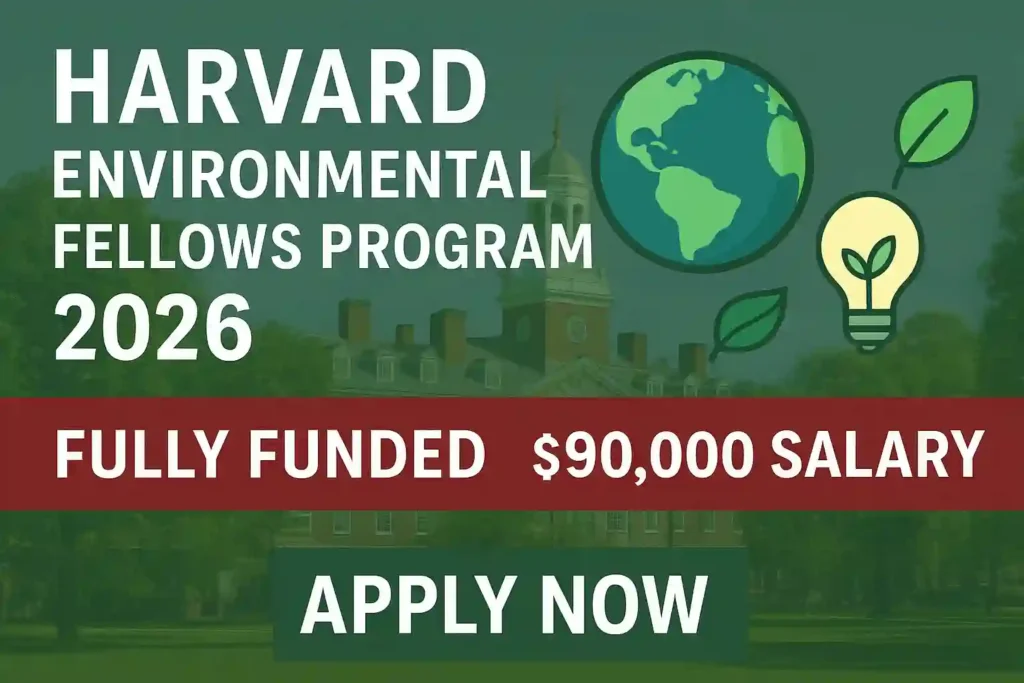The Harvard Environmental Fellows Program 2026 is one of the most prestigious fully funded fellowships in the USA for early-career researchers passionate about climate change, sustainability, and environmental studies. Offered by Harvard University, this two-year fellowship provides scholars the opportunity to work across disciplines with leading faculty members, while receiving generous financial and academic support.
About Harvard Environmental Fellows Program 2026
When we think of Harvard University, prestige, research excellence, and innovation come to mind. Beyond producing top professionals, Harvard is deeply engaged in solving global challenges—especially climate change.
The Harvard Environmental Fellows Program is designed for postdoctoral scholars who want to advance solutions to environmental issues while collaborating across disciplines such as science, law, health, policy, economics, and design.

Why This Fellowship is Unique
Unlike typical postdoctoral fellowships, Harvard’s program emphasizes cross-disciplinary research. Climate change touches multiple sectors—energy, food security, health, politics, and economics. The fellowship enables scholars from different fields to collaborate, sparking innovative solutions.
For example:
- A biologist studying ecosystems could work with an economist on carbon markets.
- A public health researcher may partner with a political scientist on climate migration.
This interdisciplinary approach makes the fellowship highly impactful and globally relevant.
Fellowship Benefits
The Harvard Environmental Fellows Program 2026 provides full funding and benefits, allowing scholars to focus entirely on research:
- Salary: $90,000 per year (competitive postdoc stipend)
- Health Insurance: Employee benefits included
- Relocation Allowance: Up to $2,500
- Travel Support: $2,500 annually for fieldwork or conferences
- Faculty Mentorship: Guidance from Harvard professors and access to interdisciplinary resources
Fellows also participate in regular seminars, networking dinners, and collaborative events—making it a vibrant, idea-driven community.
Eligibility Criteria
To apply for the Harvard Environmental Fellows Program 2026, candidates must meet the following eligibility requirements:
- Hold a PhD (or equivalent) awarded between May 2022 and August 2026.
- Applicants from all disciplines are welcome (science, law, economics, public health, policy, design, etc.) as long as the research focuses on environmental issues.
- Current Harvard affiliates may apply but must propose a new research area with a new faculty host.
- Applicants must secure a Harvard faculty host/mentor before applying.
- Proficiency in English is required.
Application Deadline: December 1, 2025
Application Process
- Fill out the online application form on Harvard’s official portal.
- Submit a 175-word abstract of your project.
- Upload necessary documents:
- Updated CV with publications
- Research proposal (main project plan)
- Three writing samples
- Statement of research vision
- Ensure your Harvard faculty host uploads a support letter before the deadline.
Why Fellowships Like This Matter
Climate-related disasters—heat waves, floods, wildfires—are escalating globally. The Harvard Environmental Fellows Program 2026 empowers researchers to create actionable, interdisciplinary solutions for real-world environmental challenges.
This fellowship is not just an academic opportunity—it is a chance to influence policy, empower communities, and contribute to a sustainable future.
FAQs – Harvard Environmental Fellows Program 2026
1. Is this fellowship only for scientists?
Ans: No, it welcomes applicants from diverse fields including law, policy, economics, and design.
2. Do I need to find a Harvard faculty host before applying?
Ans: Yes, securing a host mentor is mandatory.
3. What financial support is provided?
Ans: $90,000 annual salary, health insurance, relocation allowance, and $2,500 yearly travel support.
4. Can current Harvard affiliates apply?
Ans: Yes, but they must propose new research with a different mentor.
5. What is the deadline?
Ans: December 1, 2025.